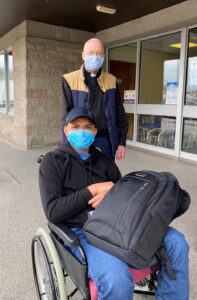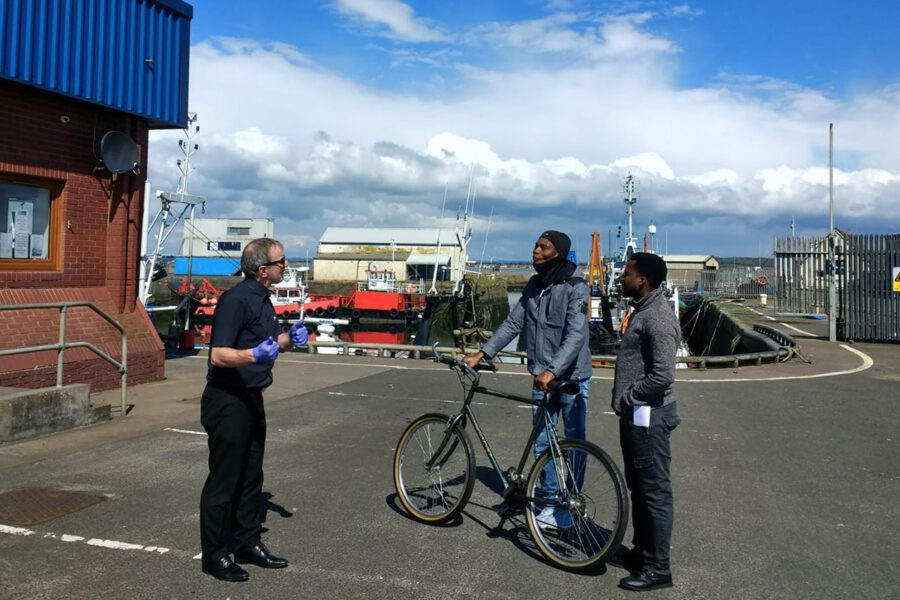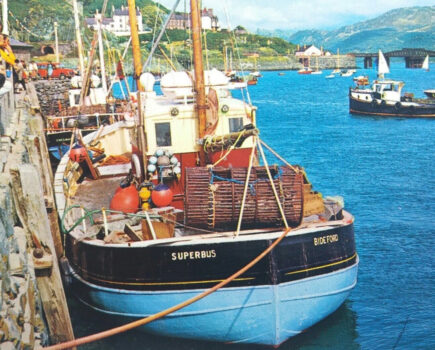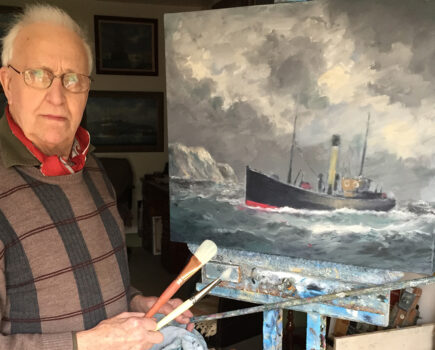Andy Read talks to Martin Foley, CEO of Stella Maris UK, about the charity’s growing role in support of foreign crewmen working on UK fishing vessels
Stella Maris is a large worldwide charity dedicated to supporting mariners, whatever type of vessel they are on. Though its work in the UK has traditionally been with the merchant fleet, the last decade or so has seen a huge growth in requests to it for support for people working in the UK fishing industry.

Stella Maris North East Scotland regional port chaplain Deacon Doug Duncan with Dilip Fernando, a young Sri Lankan fisherman who was only three months into his contract in Aberdeen when he suffered a horrendous and life-changing accident, losing his fingers and thumb on his left hand. Doug supported Dilip through his hospitalisation and recovery, and they became good friends.
Martin Foley explained: “For the UK fishing industry as a whole, the Fishermen’s Mission has always been at the forefront of supporting fishermen, retired fishermen and their families, and working closely within fishing communities, where its role is invaluable. We have a really strong and constructive working relationship with the Mission, built up over many years.

Months later, Dilip flew back home to Sri Lanka, and subsequently married his long- time sweetheart Imasha.
“Where we have seen our role growing, and requests for support coming in, is through the fact that we have an international network of support available, which can be particularly effective when supporting the welfare of foreign crew on UK vessels, and their families at home.
“For example, in the case of a bereavement back home, we can arrange pastoral support for a family in the Philippines, pastoral support for the crewman here in the UK, and/or help with fast repatriation of the UK-based crewman.
“Another example emerged this week, with a crewman who had lost his job, and had been sent to the airport by his skipper, who expected his agent to buy his air ticket. Apparently, the crewman had been at the airport for three days, before we were asked by the airport chaplain to step in and help.
“We don’t know the full facts behind this story yet – we are always extremely careful to check the facts in every case before we say anything – but we have encountered too many cases of fishermen being abandoned and unable to get home.
“Our international experience and networks can also help with the smaller things. For example, we work with many foreign fishing crew who come from a culture where shouting, or the use of swearwords, is looked on with horror.

Deacon Doug Duncan also supported a Filipino fisherman hospitalised in Aberdeen in March 2020 after a suspected stroke. Doug did his laundry while he was in hospital, and supplied him with fruit, chocolate and reading material. In July 2020, he was well enough to fly home to the Philippines to receive further treatment. The photo shows Doug accompanying him to the airport.
“What can seem day to day banter to a skipper or UK crewmates can feel like abuse and insult to a foreign crewman, when none was intended. We can see similar issues with alcohol, which can be taboo for many foreign crew.
“We’ve found, often, that a quiet conversation with a skipper, based on our experiences, can rapidly improve crew morale and performance, simply through helping to increase understanding. What can start off with scepticism from a skipper who suspects that we are, in effect, ‘troublemaking’, can quickly help to establish a new understanding and positive working relationship.
“That said, there are times, sadly, when treatment of crew goes beyond a constructive discussion and things need to be taken further. Thankfully this is rare, but there is no question that, for example, there have been instances of crew working with injuries that have not been properly treated, that have gone unreported.
“Where we need to, we will support crew members who have been subject to illegal mistreatment, where constructive dialogue can’t sort the issue. Thankfully, the number of cases we know of that have gone to the National Referrals Mechanism is very small, but we believe that more must be done to eradicate abuse and ill-treatment within the UK fishing industry.
“We also try to celebrate the good! Fishing industry news often only reaches the mainstream media when it is ‘bad’ – a particularly bad case of crew being abused, or accusations of environmental damage.
“This reflects on future recruitment of crew – what youngster wants to join an industry portrayed in this way? So it’s important that we emphasise the facts that (i) the majority of foreign crew welcome employment in the UK fishing industry, (ii) they are treated well here, and (iii) their remittances home often benefit large extended families.
“We also strongly support moves to replace the transit visa with a better system that will afford fishermen more protection from ill treatment, allow fishermen and vessel owners greater flexibility, and also remove the grey area related to fishing inside 12 miles of shore.
“I also wholeheartedly agree with Nusrat Ghani MP, the former shipping minister, who wrote recently that removing the right to work from the fishermen inside the National Referrals Mechanism ‘strips them of dignity’.
“Stella Maris is committed to supporting all fishermen, here in the UK and overseas, and to working in partnership with all stakeholders in the fishing industry who share our commitment to upholding the rights and dignity of all fishermen.”
To read more about the work of Stella Maris, click here.
This story was taken from the latest issue of Fishing News. For more up-to-date and in-depth reports on the UK and Irish commercial fishing sector, subscribe to Fishing News here or buy the latest single issue for just £3.30 here.
Image above: Stella Maris Scotland senior area chaplain Deacon Joe O’Donnell with two Ghanaian fishermen in Ayrshire. The fishermen were living in the harbour area during the pandemic and were short of funds, so Joe provided them with food and supplies and gave them his bike to use.








